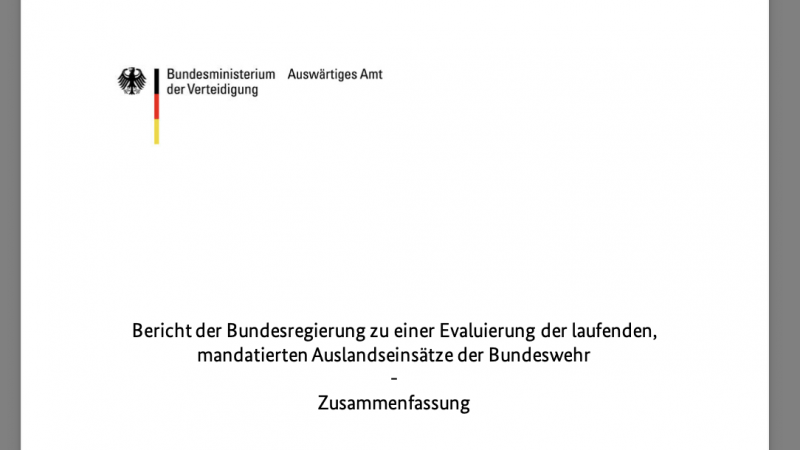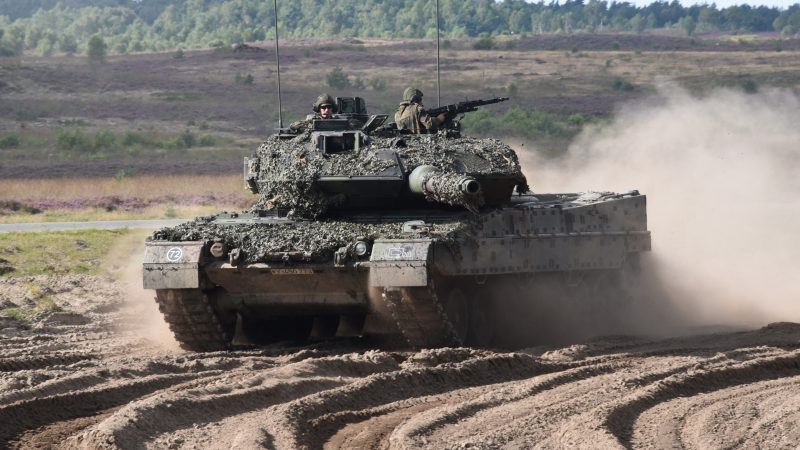Rahmenrichtlinie Gesamtverteidigung (Comprehensive Defense Guidelines) – Germany’s “New” Defense Posture

Germany is re-inventing its resilience. After the ‘Zeitenwende” it has undertaken different measures in order to strengthen its capabilities. One very pivotal document is the ‘Rahmenrichtlinie Gesamtverteidigung’ (RRGV). It are the comprehensive defense guidelines covering the whole arena of security issues. Here, its content is presented in brief. Important cross-references and links are added.
After the end of the Cold War in Europe, defense policy and civil defense were no longer priorities. The 1995 reconceptualization of civil defense downgraded this federal task. Civil defense was then merely seen as a subsidiary task for disaster relief in major incidents under Article 35 of the German Constitution. Even the 2001 terror attacks did little to change this view. It took 15 years for an update to be made. In 2016, with terrorism having long arrived in Europe, it was at least agreed that the federal government would provide support to the states in the event of major incidents. (https://link.springer.com/article/10.1007/s12399-024-00978-8)
Now, it was time for a new approach. We, from the “Forum Vernetzte Sicherheit” have demanded it several times, for example here. The “Zeitenwende” (German synonyme for a turning point in security policy) necessitated an adjustment to the existing comprehensive defense strategy. A major incident like a war on German soil has once again become probable. All existing laws focus on dealing with conventional attacks. However, new crises in Germany’s immediate sphere of interest require an adaptation of current legislation. It is explicitly mentioned that economic dependence, the vulnerability of global supply chains, and hybrid attacks pose a high risk potential. /https://www.bmi.bund.de/SharedDocs/pressemitteilungen/DE/2024/06/rahmenrichtlinie-gesamtverteidigung.html)
What is also “new” in this sense is the recently issued “Rahmenrichtlinie Gesamtverteidigung” (Comprehensive Defense Guidelines). In other words, it is Germany’s new Total Defense.
Germany’s New Total Defense -What is Defense in the Context of the Comprehensive Defense Guidelines (Rahmenrichtlinie Gesamtverteidigung, RRGV)?
The German Fundamental Law (Grundgesetz) distinguishes between the “defense case” (Verteidigungsfall) and its preliminary stages, the “tension case” (Spannungsfall) and the “consent case” (Zustimmungsfall), as well as the “alliance case” (Bündnisfall) in the so-called external state of emergency. This external state of emergency exists if the Federal Republic of Germany is attacked with armed force or if such an attack is imminent.
But what is a “consent case”? “In contrast to the general release of emergency powers as a consequence of the determination of the tension case, the consent case allows for the dosed and parliamentary-controlled release of individual provisions of emergency law. On this basis, the Bundestag can consent to the application of specific emergency regulations (e.g. individual requisition and precautionary laws) on a case-by-case basis.”
National Territorial Defense and National Civil Defense
While the Bundeswehr (German armed forces) is responsible for territorial defense, civil defense encompasses all measures aimed at maintaining defense capabilities. This includes not only supplying the population but also establishing and maintaining the Bundeswehr’s defense capabilities and operational freedom. Civil security research also plays a special role in this context.
The Comprehensive Defense Guidelines (RRGV) build upon the “National Security Strategy” of June 14, 2023. This is the federal government’s overarching security policy document for the coming years, providing guidance on aligning German security policy with the challenges of the security environment.
Integrated Security
The term “Integrated Security” is frequently used in this context. But what does it mean? Integrated Security is the collaboration of all actors, means, and instruments to comprehensively maintain and strengthen Germany’s security. This requires a joint and unified approach to military and civil defense. “Security precautions are therefore not only a national but also a societal task.” The participation of the population, science, and the economy is explicitly required.
Consequently, the federal government aims to develop a broad societal understanding of Integrated Security. To implement Integrated Security administratively, there are two fundamental guidelines: the defense policy guidelines of the Federal Ministry of Defense (BMVg) and the Civil Defense Concept (KZV). The KZV also serves as the basis for establishing and maintaining defense capabilities.
Continuity of Government
In the event of a defense case, the terms of political office holders will be extended to ensure the seamless functioning of state and government. The Federal President will remain in office for up to 9 months after the end of the defense case. Similarly, state governments and the federal government will remain in office until six months after the defense case has ended.
Details of the Comprehensive Defense Guidelines
International Partnerships, explicitly with USA and France
The partnership with the United States is particularly emphasized. While usually referring to “Germany’s allies,” the guidelines stress the importance of strengthening the partnership with the United States of America.
The relationship with France also holds a special position. In the Treaty of Aachen, both countries committed to providing all possible assistance and support, including military means, in case of an attack on either country’s territory. France is not limited to its European mainland (France métropolitaine) but also includes overseas territories (Départements d’outre-mer), covering an additional area of approximately 89,000 square kilometers. (https://www.bpb.de/themen/europa/frankreich/164961/frankreich-und-seine-aussengebiete/)
Federalism
The Comprehensive Defense Guidelines (RRGV) restrict federalism in emergencies. The states are obliged to implement federal civil defense laws without being able to enact their own regional regulations. In the event of a defense case, the federal government has the authority to issue directives to state governments, state authorities, and state police forces.
The organs with responsibility for overall civil and military defense are exclusively located at the federal level. These include the Federal President, Bundestag and Bundesrat, the Federal Chancellor, and the Federal Cabinet.
All actors are required to coordinate through the Joint Competence Center for Civil Protection (GeKoB), established in 2022.
NATO
To respond to military and non-military crises, NATO developed the NATO Crisis Response System (NCRS). According to NATO, one of the core elements is the “NATO Crisis Management Process” (NCMP). “The NCMP breaks down a crisis situation into different phases, providing a structure against which military and non-military crisis response planning processes should be designed. It is flexible and adaptable to different crisis situations.”
Germany has incorporated these as well as supplementary national alert measures into the Crisis Reaction and Alert Plan of the Bundeswehr (KAPlBw) and the Directive for Civil Alert Planning (ZAPRL) as a basis for coordinated military and civil contingency planning.
Media
The role of the media in an “external emergency” is also described. “Necessary announcements, proclamations, and other statements and information must be able to be transmitted, if necessary through a simplified procedure.”
Bundeswehr (German Armed Forces)
The Bundeswehr is responsible for protecting civilian objects of importance for military defense, the so-called “ZM objects”. In this case, the Bundeswehr may defend these objects against civilian disruptors if necessary. Fire may be opened against saboteurs, foreign forces that do not identify themselves as such, terrorist groups, or similar threats.
In the case of tension or defense, compulsory military service duties for conscripts are revived according to the Compulsory Military Service Act (§ 2 WPflG). To prepare for conscriptions and deployments, the registration authorities transmit the necessary data to the Federal Office for Personnel Management of the Bundeswehr in the case of tension or defense (§ 15 WPflG).
Men and women aged 18 to 60 can be obliged to provide assistance in combating the special dangers and damages that threaten in the event of defense, if the available forces are insufficient.
Cyber
To establish digital sovereignty and defend against cyber attacks, it is envisaged to continuously create a comprehensive cyber situational picture that involves all relevant actors.
The federal government is working on further developing reliable communication systems for classified information, relying on cryptographic technologies.
Civil-Military Cooperation
Civil-Military Cooperation of the Bundeswehr (ZMZBw) is an independent task area of the Bundeswehr and encompasses all planning, measures, forces, and means that regulate, support, or facilitate relations between Bundeswehr agencies on the one hand and civilian authorities and organizations on the other. This includes cooperation with the commercial economy. The ZMZBw is centrally controlled and coordinated by the National Territorial Commander (NatTerrBefh). The Joint Reporting and Situation Center of the Federal Government and States (GMLZ) at the Federal Office of Civil Protection and Disaster Assistance (BBK) is the national situation center for civil protection and disaster relief. The GMLZ is a central interface between the federal government and states, federal ministries, the Federal Republic of Germany and other countries, as well as inter- and supranational organizations.
Healthcare
The healthcare system in Germany must be structured in such a way that, even in peacetime, the civilian population, the Bundeswehr, and allied forces can be provided for in the event of a supply crisis.
The healthcare system must be prepared for a mass casualty incident (MANV) even during normal operations. Since 2007, a report with recommendations from the corresponding working group has been available. It cannot be determined at this point which of the recommendations have been comprehensively implemented.
The federal government commits itself to establishing a National Reserve for Health Protection (NRGS).
Food and Energy Security
The self-sufficiency rate for food in Germany is just under 90 percent (without production from imported feed, about 5 percent lower). However, the level of self-sufficiency varies considerably for individual products. For certain products, the Federal Republic of Germany is not self-sufficient; in particular, the need for imports is high for fruits and vegetables, vegetable oils and fats, and protein feed.
Citizens, however, are advised to maintain a 10-day food supply.
To secure the supply of mineral oil, the German Petroleum Stockpiling Association is required by law to maintain stocks for 90 days of net mineral oil imports.
The federal states have adopted priority programs for drinking water protection, which provide for specific hardening and resilience measures to maintain drinking water supply within different timeframes.
Critical Infrastructure
In 2021, NATO member states agreed on a resilience commitment with a further focus on protecting critical infrastructure, key industries, and supply chains. NATO’s new strategic concept adopted in 2022 emphasizes “that ensuring our national and collective resilience is essential for all our core tasks and underpins our efforts to protect our nations, societies, and shared values.” At NATO, a Resilience Committee coordinates measures and reports directly to the North Atlantic Council, NATO’s principal political decision-making body.
Rahmenrichtlinie Gesamtverteidigung –Legal Aspects
As with the extension of terms for political office holders, there are further legal special regulations related to preparation and response in the case of tension and defense. Here is an overview:
Germany’s security is derived from the North Atlantic Treaty (NATO), in accordance with Article 51 of the United Nations Charter and the enshrined right to join a collective security alliance.
According to Article 42(7) of the Treaty on European Union, all EU member states are obliged to provide all aid and assistance in their power to an attacked EU member state. This is a stronger commitment than that of the NATO treaty, which does not include such a clause. It is fundamentally up to each individual state to determine the extent to which it can and will provide support.
The Common Security and Defense Policy (CSDP), as part of the Common Foreign and Security Policy (CFSP), provides the framework within which mutual support takes place – even before the case of defense arises. This applies, for example, in the form of joint political and diplomatic action.
Civil protection in Germany is regulated by the “Law on Civil Protection and Disaster Relief of the Federal Government” (ZSKG).
The KRITIS Umbrella Act has been in force since 2024 and implements the EU Directive EU RCE in Germany by imposing additional obligations on operators of critical facilities: reporting obligations, BCM, physical security, personnel, and crisis management.
The Law on Ensuring Basic Food Supply in a Supply Crisis, the so-called “Food Supply Security and Precaution Act” (ESVG), creates the possibility for the federal government to demand information from food industry companies and distribute food by legal order.
The Transport Security Act regulates the support obligations of the commercial economy in emergencies.
The Federal Service Act regulates the support services (peacetime services) to be provided by the population to the Bundeswehr.
The Labor Security Act regulates the obligation and deployment of employees in vital areas of the economy.
In conclusion, Germany’s primary goal is to resolve a crisis. Therefore, measures of diplomacy, negotiations, and strategic communication are essential. However, Germany’s preparations for a war with Russia, with 2029 being the date when Russian forces are expected to regain the strength to make a “great leap” directly onto NATO territory, show that this is not always promising.
As Defense Minister Boris Pistorius states: “The comprehensive defense of Germany is a task to which we all must contribute, state and civil institutions, as well as each and every one of us. We need a resilient society that can cope with the challenges. Many are already making very valuable contributions in the THW, DRK, or as reservists in the Bundeswehr.”
Rahmenrichtlinie Gesamtverteidigung – Additional Documents
The Directive for Civil Alert Planning summarizes the tasks that are triggered by the corresponding alert in the consent, tension, defense and alliance cases, as well as in foreign policy and military crises, and must be carried out to protect and supply the population, maintain state and government functions, and support the Bundeswehr: https://www.bbk.bund.de/SharedDocs/Downloads/DE/BSMAG_Artikel/2022-02/2022-02_06.pdf?__blob=publicationFile&v=2
The Law on Civil Protection and Disaster Relief of the Federal Government (ZSKG) regulates the tasks of civil protection, which are carried out by the states on behalf of the federal government (Auftragsverwaltung). https://www.gesetze-im-internet.de/zsg/
Further links
https://link.springer.com/article/10.1007/s12399-024-00978-8
https://www.previval.org/f/forum
https://www.verwaltungsvorschriften-im-internet.de/bsvwvbund_10011989_080102.htm
https://www.bmvg.de/de/aktuelles/wehrverfassung-die-bundeswehr-im-grundgesetz-5784788
https://www.verwaltungsvorschriften-im-internet.de/bsvwvbund_10011989_080102.htm
https://link.springer.com/article/10.1007/s12399-024-00978-8
https://www.verwaltungsvorschriften-im-internet.de/bsvwvbund_10011989_080102.htm
https://www.nato.int/cps/en/natohq/topics_49192.htm#:~:text=Within
https://www.nato.int/cps/en/natohq/topics_49192.htm
https://starfos.tacr.cz/en/projekty/OVZLD20090001
https://www.researchgate.net/publication/332414974_Crisis_Management_In_NATO
https://starfos.tacr.cz/en/projekty/OVZLD20090001
https://www.nato.int/cps/en/natohq/topics_49192.html
https://www.researchgate.net/publication/332414974_Crisis_Management_In_NATO
https://www.openkritis.de/it-sicherheitsgesetz/kritis-dachgesetz-sicherheitsgesetz-3-0.html
https://www.gesetze-im-internet.de/esvg/BJNR077210017.html
https://www.lexsoft.de/cgi-bin/lexsoft/justizportal_nrw.cgi?xid=139684%2C30
https://www.gesetze-im-internet.de/zsg/__1.html
https://www.bmvg.de/de/aktuelles/wehrverfassung-die-bundeswehr-im-grundgesetz-5784788






